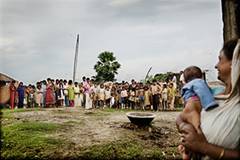A ground-breaking study on caste discrimination in the Indian state of Gujarat shows that the practice of ‘untouchability’ is still prevalent. The report also makes clear that the Indian legal system is failing to address the issue.

Caste discrimination prevents Dalits from crossing a road in this village in Bihar. The new study shows that the practice of ‘untouchability’ is rife in India. Photo: JAKOB CARLSEN
Discrimination against Dalits penetrates numerous aspects of daily life in India. It affects access to education and medical facilities and imposes restrictions on housing and what kind of work Dalits can carry out. Moreover, the practice is universal – despite national laws banning it.
Such are the findings of a new report by the Dalit rights organisation Navsarjan Trust in cooperation with the Robert F. Kennedy Center for Justice and Human Rights (RFK Center). The study ‘Understanding Untouchability’ is based on research carried out across 1589 villages in Gujarat. It outlines a pattern of persistent discrimination against Dalits by members of dominant castes – but also between Dalit sub-castes.
All in all, the report lists 98 forms of discrimination by non-Dalits against so-called ‘untouchables’. The numbers speak a very clear language: In 98.4 percent of the villages surveyed, inter-caste marriages are prohibited and would often be met with violence. In almost as many cases, Dalits cannot rent a house in a non-Dalit community; they must not touch the water pots or utensils of non-Dalits; and Dalit religious leaders are never asked to celebrate a religious ceremony in a non-Dalit area.
While the study was carried out in rural Gujarat, it also refutes the traditionally held belief that caste discrimination is limited to remote and economically underdeveloped corners of India. According to its authors, the report’s findings should be used to ‘demonstrate the Government of India’s continued ignorance about the depth of the problem and its legal obligations in regard to the abolition of untouchability.’
“Caste-based discrimination is the most complex human rights issue facing India today. It is our hope that these findings will provide critical data for the Dalit movement to shape its interventions, for the Government of India to seriously and systematically examine and address its own gaps in ending discrimination, and for the international community to apply similar approaches to ending discrimination globally,” said Monika Kalra Varma, Director of the RFK Center.
Following the publication of the report, Navsarjan Trust’s executive director, Manjula Pradeep, noted that ‘the report shows that the existing legal systems has failed to address the problem of untouchability and it is time for human rights activists to act strongly.’
The organisation’s founder, Martin Macwan added the following conclusion: ‘Understanding untouchability is crucial to ending untouchability. Dalits face untouchability in every aspect of their lives. By lifting the veil of ignorance we have no excuse not to end it,’ he said.
Click here to download the full report
Click here for the press release launching the report
Click here for press clippings
